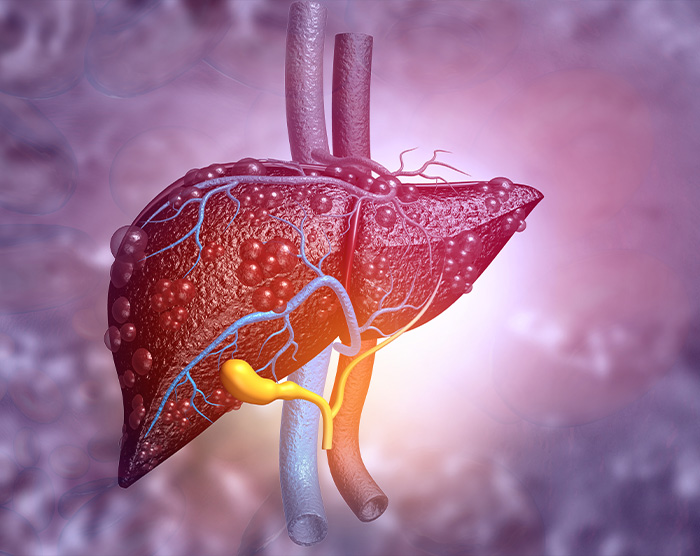We use large-scale genomic data to gain insights into human disease to enhance our ability to prevent, manage, and treat them.
DNA is known as the ‘blueprint of life’, containing the instructions needed for an organism to develop and function. Though on average the DNA sequence of two human beings is 99% similar, it’s the differences that make us unique, but also determine how we respond to the environment and make some of us more susceptible to disease. Studying our genome using the latest genomic technologies can therefore provide in-depth insights into how our body functions and what goes wrong in disease.
We have a focus on cardiovascular and liver disease and also collaborate with clinicians to use genomic data for clinically-driven research that can improve patient outcomes.
Group leader

Dr Sonia Shah
Group Leader, Genomics in Health
National Heart Foundation Future Leader Fellow
+61 7 334 62623
sonia.shah@imb.uq.edu.au
UQ Experts Profile

The South Asian Genes and Health in Australia Study (SAGHA)
Cardiovascular disease risk factors, age-of-onset and response to treatment can vary by ancestry. However, medical guidelines on heart disease prevention and treatment are based on data from mostly people of European ancestry. South Asians make up almost 25% of the world’s population, but less than 2% of genetic research participants. Greater representation of diverse communities in research will help us reduce health inequity.
The South Asian Genes and Health in Australia Study (SAGHA) aims to increase representation of Australian South Asians in genomic and health research.

Liver disease research
In Australia, around 400 new patients are put on the liver transplant waiting list each year with approximately 40% of them not receiving their lifesaving transplant (within a year of listing) and up to 10% not receiving it at all due to death or the disease progressing too far.
To address the shortage, livers donated after circulatory death (DCD) are being used. They must, however, pass stringent selection criteria and use normothermic machine perfusion (NMP) which is a new organ storage technique that preserves livers at body temperature using an artificial circulatory system (as opposed to storage on ice). In collaboration with surgeons from the QLD Liver Transplant Unit, we are using genomic technology to improve identification of viable livers following NMP.

Gender matters: improved understanding of cardiovascular risk factors unique to women
Cardiovascular disease is the leading cause of mortality for women. However, cardiovascular disease in women has been under-researched and as a result is under-recognised, under-diagnosed and under-treated, leading to inequity in cardiovascular health. We use large-scale health and genomics data to better understand cardiovascular risk factors that are unique to women, with the long-term goal of improving prevention and treatment of cardiovascular disease in women.

AMBER : Antidepressant Medications: Biology, Exposure & Response
The AMBER study (Antidepressant Medications: Biology, Exposure & Response) is funded by Wellcome in a Mental Health Award to identify the causal determinants of antidepressant response (2023-2028).
Dr Shah is using cell models to understand how antidepressants work and looking at the feasibility of using patient cell lines for personalised medicine to identify the best antidepressant for each patient.
If you are interested in undertaking any of the PhD projects below. Please reach out to Dr Sonia Shah including the project name in the subject line and with an up to date CV attached.
1. Gender matters: Using genomics data to understand sex-specific risk in heart disease
*this project qualifies for the Global Challenges Scholarship
Principal Advisor: Dr Sonia Shah
Associate Advisor: Prof Gita Mishra
The 2019 Women and Heart Disease forum highlighted clear disparities in CVD outcomes between males and females. The report (Arnott et al 2019 Heart, Lung and Circulation), highlighted a need to increase our understanding of sex-specific pathophysiology driving susceptibility to common diseases, and identification of sex-specific risk factors to improve early detection and prevention of CVD in women. Until recently, sex-specific research was underpowered and most studies on heart disease included a much smaller number of female participants. But this is beginning to change with the availability of large biobank data.
This project will require statistical analysis of very large datasets with health records linked to genomic data to address these gaps in our understanding of heart disease in women. This includes data from the UK Biobank cohort in ~500,000 individuals (54% women) and data from the Australian Women’s Longitudinal Study (led by Prof Gita Mishra), a study looking at the factors contributing to the health and wellbeing of over 57,000 Australian women, and is the largest, longest-running project of its kind ever conducted in Australia.
This project will lead to a better understanding of sex-specific risk factors for CVD, which will inform better CVD prevention strategies in women.
Fellowships:
Investigating the relationship between cardiovascular and neurological disorders
NHMRC early career fellowship 2018-2021 ($193,767)Using genomic data to improve the understanding, prevention, and management of cardiovascular disease
National Heart Foundation Future Leader Fellowship 2022-2025 ($520,000)
Project Grants:
- Identifying unintentional effects of medication using statistical genetics analyses of large-scale genetic and genomic data
NHMRC Ideas grant (Lead researcher) 2021-2022 Evaluating the utility of polygenic risk scores within the Queensland Cardiac Genetics Clinic
UQ ECR knowledge exchange and translation fund (Lead researcher) Jan - Dec 2022Using genomics to understand liver metabolism in organ donors and ex-vivo machine perfusion
Metro South Collaborative Grant (Lead researcher) 2022-2024Preparing Australia for use of genomics in prevention of heart disease - A focus on South Asian Australians
Medical Research Future Fund Genomics Mission (Lead researcher) 2022 - 2024TRIAGE: A disease agnostic computational and modelling platform to accelerate variant classification
Medical Research Future Fund Genomics Mission 2022 - 2025The Australian Genetic Diversity Database: towards a more equitable future for genomic medicine in Australia
Medical Research Future Fund Genomics Mission 2022 - 2027ACTIVATION OF AMPK TO TREAT ABDOMINAL AORTIC ANEURYSM (5As)
Medical Research Future Fund (MRFF) Cardiovascular Mission 2024 - 2027- AAA-Medical: Integrating Synergistic Expertise For Better Treatment Of Abdominal Aortic Aneurysm
NHMRC Synergy Grant 2024 - 2029 ($5 million) Understanding The Causal Mechanisms Of Antidepressant Exposure And Response. I am leading one of five work packages using cell-based gene expression studies to understand antidepressant mechanism of action
UK Wellcome Trust Mental Health Award 2023 - 2028
Developing UQ's First High-Throughput Genomics Pipeline For Drug Discovery
(2023) UQ Foundation Research Excellence AwardsA Systems Epidemiology Approach To Define Metabolic And Genomic Determinants Of Alzheimer's Disease (NHMRC Project Grant administered by Baker Institute)
(2019–2022) Baker IDI Heart & Diabetes InstituteHealthy heart, healthy brain - using genetic data to investigate the causal relationship between cardiovascular and neurodegenerative disease
(2018–2021) NHMRC Early Career Fellowships
- Group Leader, Dr Sonia Shah is the recipient of numerous awards including:
- 2024 Australian Academy of Science Ruth Stephens Gani medal for outstanding contribution to human genetics research
- 2023 1 of 5 global finalists for the Nature Inspiring Women in Science award
- 2023 Rose-Anne Kelso Commemorative Award
- 2022 Queensland Young Tall Poppy Award
- 2022 UQ Foundation Research Excellence Award
- 2021/2022 Australian Superstar of STEM
- 2020 Women in Technology Rising Star Science Award
- 2020 Genetic Society of Australasia Early Career Award
- Dr Solal Chauquet: Best ECR oral presentation at Genemappers 2024
- PhD student, Zoe Hunter: Best Student poster at Genemappers 2024
- Dr Clara Jiang: Best ECR oral presentation for the 2024 International Society of Heart Research ECR Symposium
- PhD student, Mr Xiadong Mo, received the 2022 Oral abstract prize at the International Clinical Cardiovascular Genetics Conference
- Post-doctoral research fellow, Dr Clara Jiang attended the 'Falling Walls Lab 2022' where she presented 'Repurposing drugs: breaking the wall of treating depression'.
- Investigating the potential anti-depressive mechanisms of statins: a transcriptomic and Mendelian randomization analysis
- Association of antihypertensive drug target genes with psychiatric disorders: a Mendelian randomization study
- Genome-wide association and Mendelian randomisation analysis provide insights into the pathogenesis of heart failure
- Prof Julie McGaughran and Prof John Atherton (Queensland Cardiac Genetics Clinic, Royal Brisbane Women's Hospital)
- Queensland Liver Transplant Service (Dr Nick Butler, Dr Peter Hodgkinson), Princess Alexandra Hospital
- HERMES Heart Failure Consortium https://www.hermesconsortium.org/
- University College London, UK (Dr Tom Lumbers)
- King's College London, UK (Prof Cathryn Lewis)
- The University of Edinburgh, UK (Prof Andrew McIntosh)
Our approach
We apply innovative statistical methods to genomic data generated using the latest genomic technologies in health-related research.
Research areas
Cardiovascular disease
Our research includes understanding heart failure biology, genetic prediction of cardiovascular disease, and understanding cardiovascular disease risk in understudied groups, including women and individuals from diverse ancestries. We lead the South Asian Genes and Health in Australia (SAGHA) Study focused on CVD risk in the Australian South Asian population.
Pharmacogenomics
The pipeline from drug discovery to market approval can take over 10 years and cost over 1 billion USD, with very high failure rates due to lack of safety or efficacy. Using a genomics approach, we are developing a pipeline that can better predict efficacy and safety of a drug in humans and reduce failure rates of the drugs that enter human clinical trials.
Liver transplant research
Northothermic machine perfusion (NMP) is a new organ storage technique that preserves livers at body temperature using an artificial circulatory system (as opposed to storage on ice). NMP has recently been implemented in Australia to address the shortage of liver transplant organs. NMP allows safe use of marginal livers that would normally be discarded by allowing surgeons to assess liver function before transplant. In collaboration with surgeons from the QLD Liver Transplant Unit who were the first to implement NMP in Australia, we are using genomic technology to improve identification of viable livers following NMP.
Latest news
-
-
Debunking autism myths rewarded with national prize
30 November 2022 -
IMB grows two Young Tall Poppies
30 August 2022
General enquiries
+61 7 3346 2222
imb@imb.uq.edu.au
Media enquiries
IMB fully supports UQ's Reconciliation Action Plan and is implementing actions within our institute.
Support us
Donate to research
100% of donations go to the cause








